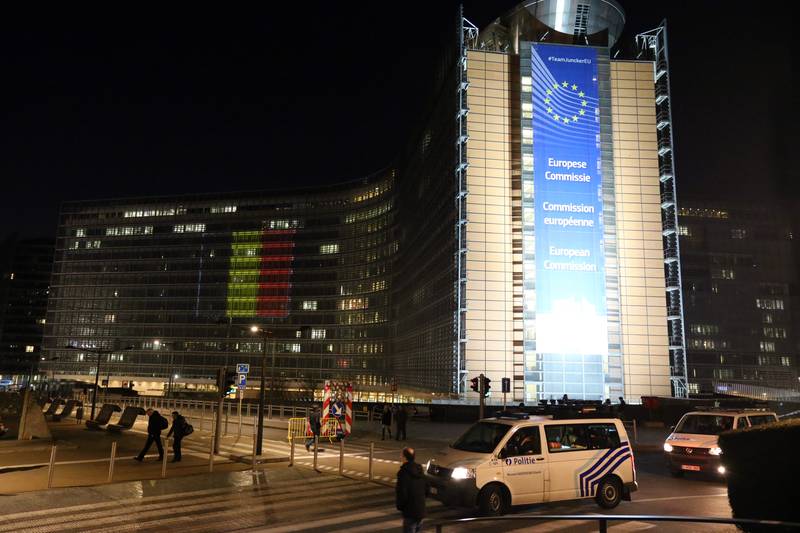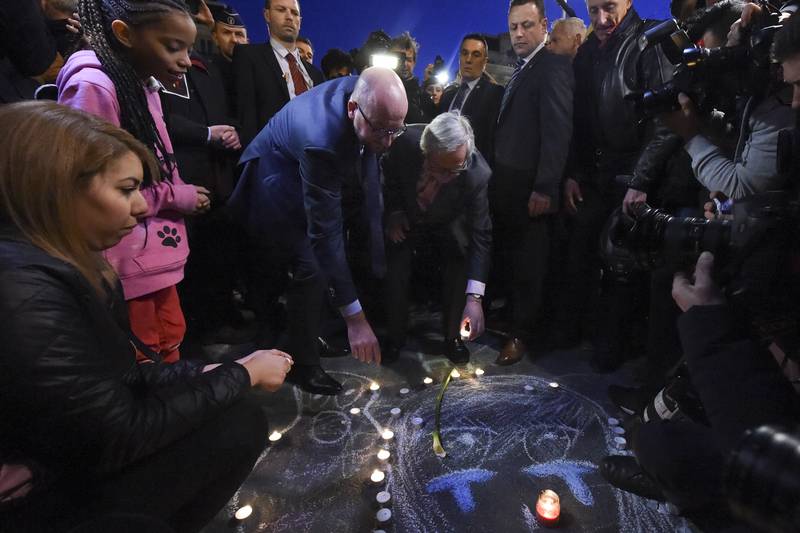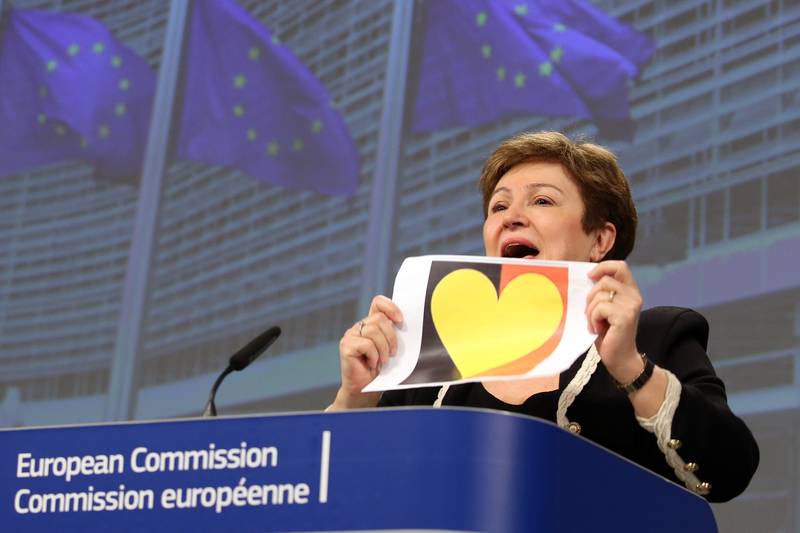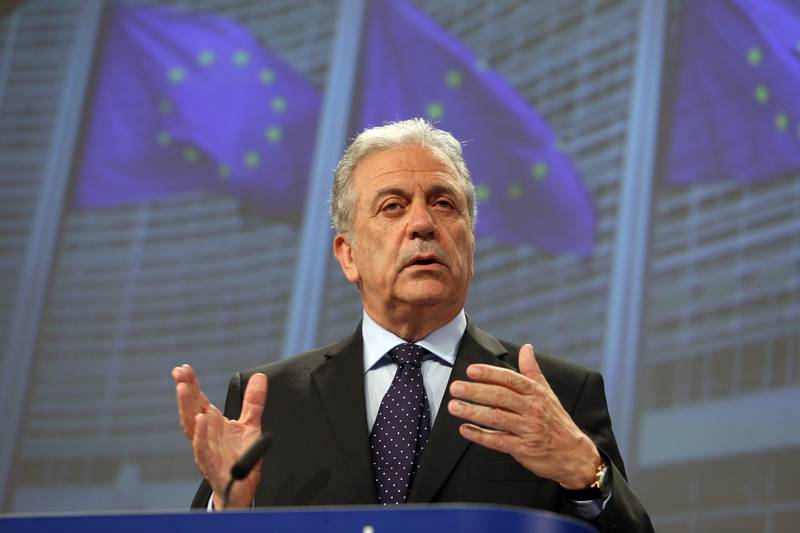Will the Brussels Attacks Finally Unite Us?
Adelina Marini, March 24, 2016
 The bombing attacks in Brussels of the morning of March 22 are somewhat different from the Paris horror just several months earlier. The blasts at the Brussels Zaventem airport and in the Maalbeek underground station, situated in the European district of Brussels, showed quite clearly that this is an attack against the European institutions, ergo the European Union as such. The first reactions were of compassion for the country of Belgium, to Belgian citizens. The fact that this is a hit against the EU was first hinted by European Council President Donald Tusk (Poland, EPP). In a special statement, he initially said that the attack was against “our open democratic society”, but later added: “Our common European institutions are hosted in Brussels, thanks to the generosity of the government of Belgium and the Belgian people”.
The bombing attacks in Brussels of the morning of March 22 are somewhat different from the Paris horror just several months earlier. The blasts at the Brussels Zaventem airport and in the Maalbeek underground station, situated in the European district of Brussels, showed quite clearly that this is an attack against the European institutions, ergo the European Union as such. The first reactions were of compassion for the country of Belgium, to Belgian citizens. The fact that this is a hit against the EU was first hinted by European Council President Donald Tusk (Poland, EPP). In a special statement, he initially said that the attack was against “our open democratic society”, but later added: “Our common European institutions are hosted in Brussels, thanks to the generosity of the government of Belgium and the Belgian people”.
In his statement [in Bulgarian], on the subject of the attacks, Bulgarian Prime Minister Boyko Borissov was completely straight-forward: “Brussels is not just the Belgian capital. It is the capital of united Europe”, he said. A number of European leaders, politicians, and diplomats came out with similar statements later. The reason is obvious. Zaventem airport is the most used one by European politicians and officials. There are several flights per day to the Belgian capital from the member states. The first ones are early in the morning, so that travelling officials can arrive on time for sessions and meetings. The Maalbeek underground station is positioned on one of the busiest streets in the European district of Brussels. It is just several hundred meters away from the buildings of the European Parliament, the Council, and the Commission.
Thousands of employees in these institutions arrive to work on this very line of the underground and often come off on this very station. The fact that the rush hour was chosen is especially indicative of the terrorists’ message. The recap is 11 dead at Zaventem, 20 at “Maalbeek” and a total of 260 wounded. Among them, as the EC announced on Wednesday after the College meeting, are three employees of this institution. The European district of Brussels is a true Babylon. There hardly is a person, who does not have relatives, friends, or acquaintances, who work full-time in Brussels or often travel to it on business. So, the first thing of everyone in all corners of the EU, including candidate states, was to call or enquire over the Internet about how their friends and relatives were.
Solidarity fatigue or an ever stronger Euroscepticism?
After the attacks yesterday again there was a torrent of pictures, cartoons, and exhibitions of solidarity. There was no way to disregard the fact that there was a certain fatigue felt in the solidarity exhibitions. And although, just like after Bataclan, member states' leaders came out with a joint statement yesterday, which to a great degree reiterates the words of President Tusk, you could not help but notice that the emotion was not as strong as the one after Paris. Back then, in all capitals buildings were lit in the French flag. On Tuesday evening, the images from European capitals were scarce.
The most circulated ones were from Berlin, where the Brandenburg Gate was lit up in the black-red-yellow of the Belgian flag and Paris, where the Eifel tower was also lit in the three Belgian colours. In Italy, the popular Trevi fountain was lit in these colours. The EC building was also lit up with the Belgian flag, just like after Bataclan. Zagreb was the only city that alternated the Belgian flag with the European one on the outside video walls of the famous Lisinski concert hall in the city centre.

Not only did the shows of solidarity seem weaker and fewer, but facts show that solidarity in general, throughout the EU, boils down mainly to such performances. Measures taken at the European level for fighting terrorism and guaranteeing the safety of citizens are scattered and work on them is slow. It is more often that any work done is piecemeal and on a national level, rather than on an EU level. Reactions after the bombings in Brussels showed dominance of the voices in favour of common European actions, but there were also a fair number of those who believe that it is namely unified Europe, which is at the root of all the trouble. According to Hungarian Foreign Minister Péter Szijjártó, illegal immigration has “undoubtedly” increased the terrorist threat in Europe, which is a direct attack at German chancellor Angela Merkel and her humane policy towards refugees. There are others of a similar opinion, who resist the solidary acceptance of refugees.
There were isolated voices in Croatia as well, which questioned whether unified Europe is not actually bringing a threat to national security. Such attitude was shared by one of the new members of the Croatian parliament, Stipe Petrina, of the new political force made up of independent lists – MOST. He is famous for his controversial statements. In front of the regional TV channel N1 (a subsidiary of CNN), he said [in Croatian] that the EU and NATO needed countries like Croatia far more than vice versa. This is not a problem just for Belgium, France, Germany, and other countries, but for all of us, he said. “Today it is Brussels, tomorrow it could be Dubrovnik, Split, or Zagreb”, he said and warned that if the EU or NATO issued an attack order, this includes Croatia, thus equalising the threat to Croatia as well.
While the majority only urged for common actions, Italian PM Matteo Renzi came out with a specific proposition for common European defence. “Today they hit Belgium, but they also hit the capital of the European Union”, said the Italian PM. “We need a European pact, a pact for freedom and security. Europe must go all the way this time. We must invest in a common security and defence structure”, he added. The idea of common defence is not new, but has been put in the freezer for the moment. Exactly a year ago, EC President Jean-Claude Juncker (Luxembourg, EPP) proposed the formation of a common European army, for NATO is not enough, because not all EU members are members of the trans-Atlantic alliance. “A joint EU army would show the world that there would never again be a war between EU countries”, he said in an interview for the Sunday issue of the German newspaper Die Welt – Welt am Sonntag.
This, however, was not met with enthusiasm. Last autumn, before the Paris attacks, the group of the European People’s Party in the EP came out with a similar idea. According to the European Defence Agency’s 2013 data, member states have spent 186 billion euro on defence. The Union has a total of one million 435 thousand troops. More than the United States. Nevertheless, the EU is extremely inefficient. According to the EPP, the lack of cooperation and coordination, as well as inefficient spending lead to “disastrous operational results, is a waste of taxpayers' money and weakens our security”.
The idea of the EPP is to use to the maximum Article 42(7) of the Treaty for the EU. The group feels that this article should turn into the European equivalent of Article 5 of the NATO treaty. A similar spirit is felt in the European Parliament resolution, voted in January, which is entirely dedicated to the common defence clause in Article 42(7). This article obligates member states to provide aid to a member, which has become a victim of armed aggression on its territory. The obligation is legally binding to all states, excluding those that have declared neutrality, and if it is not in conflict with a NATO membership. The treaty for the EU provides for one more clause, which has been invoked for the first time after the terrorist attacks  in Madrid in 2003. It is about the solidarity clause, embedded in Article 222 of the Treaty on the Functioning of the European Union (TFEU).
in Madrid in 2003. It is about the solidarity clause, embedded in Article 222 of the Treaty on the Functioning of the European Union (TFEU).
The European Parliament believes the EU needs a permanent civil-military headquarters, which will be given the task of providing strategic and operative planning, including the joint defence, provided for in Article 42, as well as ensuring cooperation with NATO. For the moment, though, these are just suggestions, floating in the air. There is no specific initiative on them by the European Commission, which would be the base for work in the Council and European Parliament, so that it has direct effect on the EU.
Due to the more and more common terrorist attacks in different parts of Europe, the EC came out with several proposals, work on which has been going slow. Not just that, but legislation already voted in is not being used enough. Since 2005 there has been a policy at disposal for fighting terrorism, which is a legislative step. Last year, the EC presented a European security agenda, and after the Paris attacks it made several more proposals, among which is the fight against the financing of terrorism. European Commissioner on Migration and Home Affair Dimitris Avramopoulos (Greece, EPP) stated on Wednesday that at the moment there are several proposals on the table, but work on them is going really slow. He urged member-states and the European Parliament to speed up the work on those. The threat against Europe requires a European reply, he said. “We cannot keep learning the hard way, but the events in Brussels show that we absolutely need more coordination and more information and intelligence sharing”.
“Our information needs to be interconnected. Our systems need to talk to each other. Member states have to trust each other”, added the Commissioner, drawing the line around the main problem, faced by EU unity. At their latest meeting in the beginning of March, interior and justice ministers of the EU agreed on their negotiating position with the European Parliament on a draft anti-terrorism directive. An emergency meeting of the ministers is forthcoming, perhaps as early as this week, announced Commissioner Avramopoulos. On the proposal for controlling the purchase and possession of firearms there is an agreement expected by the end of June. Negotiations are going forth on the technical level.
Work is also slow on the proposal for an upgrade of the European border agency FRONTEX. The Dutch presidency has made it its goal to reach an agreement on a text by the regular meeting of the Justice and Home Affairs Council in April. To many, nationalisms are no solution, but to others they are. Euroscepticism will prove a serious obstacle to the unification of the EU, even after such a direct hit against the EU. All the problems that the EU is facing will not disappear. Neither could trust be built overnight, especially towards countries, which show sustainable inability to create an independent judiciary and institutional security, such as Bulgaria.
The need for pooling more and more sovereignty in deeper and deeper spheres of national security and the nation-state is provoking in direct proportion a stronger support for Eurosceptic powers. Some are so arrogant in the pursuit of their goals that they didn’t even wait for the dust to settle after the Brussels explosions of yesterday to announce that it was exactly the EU, Schengen, and the ever deepening integration that were responsible for them. The referendum for Great Britain’s EU membership on June 23 will surely delay much of the work on the already cautious integration steps towards joining efforts in the fight against terrorism. Different views on the refugee crisis and the corresponding asynchronous  actions further complicate the problem, for coordination is still scarce regarding who is entering where with what documents and which country is to give them asylum.
actions further complicate the problem, for coordination is still scarce regarding who is entering where with what documents and which country is to give them asylum.
The terrorist attacks will probably tempt some more authoritarian governments to continue building illiberal societies. In other words, the answer to the question “Will the Brussels attacks succeed in uniting us?” is “Hardly”, because, although everyone states that these bombings are direct attacks on European values, the concept of those values sometimes differs to a degree that makes joint effort impossible. Ideological views are also one of the obstacles in front of building trust among member states, which is what Commissioner Avramopoulos keeps advocating.
Translated by Stanimir Stoev
 Federica Mogherini | © Council of the EU
Federica Mogherini | © Council of the EU | © Council of the EU
| © Council of the EU Luis De Guindos | © Council of the EU
Luis De Guindos | © Council of the EU